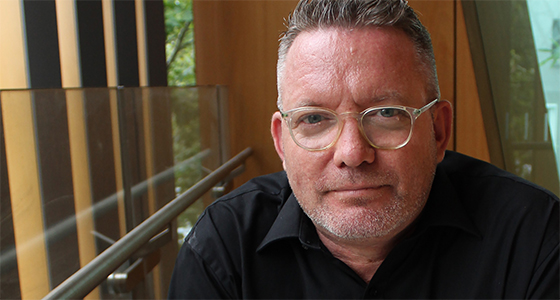
Stephen Lunny wears many hats: by day the Community Development Worker at Surry Hills Neighbourhood Centre (SHNC), and in his spare time, Director and Vice-President on the Positive Life NSW Board and board member at the National Association of People with HIV Australia (NAPWHA). In a life filled with community work from his teen years, Stephen finds it all fulfilling.
“I came to the PosLife Board as both a community member and community worker,” Stephen said. “I always thought I would do my bit. I was voted onto the Board in 2017, perhaps because of my lived experience of HIV and HIV community sector background.
“What I love about the PosLife Board is that it remains a Board that only has people living with HIV on it and that’s a really powerful thing.
“It’s especially valuable because I’ve always been a fan of peer support and the peer voice, and the way health outcomes can be so greatly improved the more active participation that peers have in organisations for them. I have found the Positive Life Board to be such a supportive, collegiate, cohesive, and fantastic bunch.
“I think having have a diverse range of people on any Board strengthens the capacity for the organisation to do good things for the community.
Normally in his day job at the SHNC, Stephen’s work with the community is varied. “We are set up as a general neighbourhood centre, and we provide children’s services also,” he explains.
From the very young to older people, Stephen coordinates a range of supportive programs and activities for a broad community including people living with HIV.
He particularly highlights the Eat Well, Live Well program, a long standing strong partnership with the Bobby Goldsmith Foundation. These are hands-on cooking sessions with additional learning around the table, “where we all cook together and learn about healthy, simple, affordable ways to eat,” he said. “I always say that the most important part is the social connection, I’ve seen meaningful and lasting friendships come from that table and that’s priceless.”
“We offer one-on-one computer support through the SHNC. The majority of our [HIV] cohort is over 55 years of age,” said Stephen. “People living with HIV do have higher rates of cancer and cardiovascular disease, so frailty is at a higher rate than the general community; being digitally connected can really help if you are living with some of these conditions.”
Now during lockdown Stephen is still busy, from organising food hampers “delivered contactless but with warmth”, to coffee walks.
“I am doing coffee walks, because you can exercise with one person,” he said. “The recurring theme is mental health issues and often depression, either people have always had depression and now it’s presenting again, or people who have never had depression are experiencing it because of COVID lockdowns and isolation and anxiety.”
Stephen runs a Do Drop In community café day on Fridays include music and access to a Justice of the Peace.
“We encourage our staff to sit down and have a chat in a COVID-safe way; five-dollar haircuts once a month; and when we come back from lockdown, we’re going to start a bimonthly film club; and we’re also thinking about a bimonthly Countdown Day.
“There’s affordable lunches and no-charge food and drink options as well…it’s a really safe space for people living with HIV.”
As a Director with the Positive Life Board, Stephen is a strong advocate for people living with HIV being linked in with their peers whether socially or at a Board level.
“If you’ve ever thought about being on a Board at all or are considering it, reach out to Pos Life and ask to speak to a Board member. They’ll put you in contact with someone to have a chat with, and ask questions, or just throw your hat in the ring.”
“I feel blessed by my Board experience,” he said. “They talk about volunteering as ‘giving back’, but I find that I get back a lot more than I give.”
– Positive Life NSW
Published in Talkabout #197 August 2021






